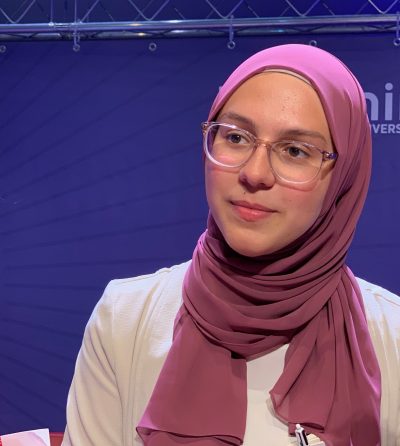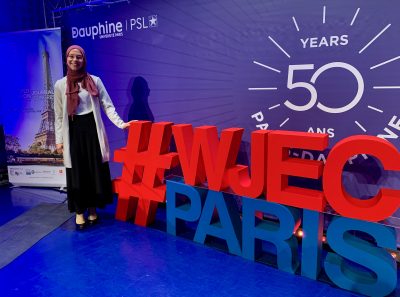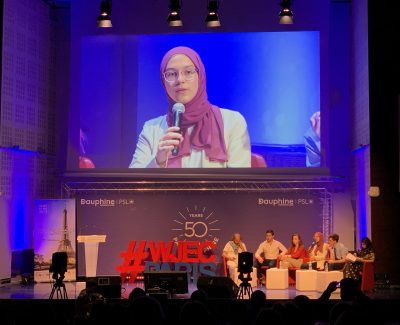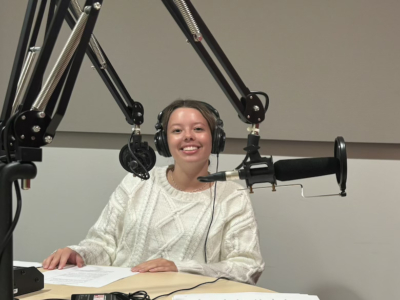By Jena Lynde-Smith
Journalism is not a dying field, it’s an evolving field.
This was one of Safiyah Marhnouj’s key take-aways from the World Journalism Education Congress (WJEC). Marhnouj, a second-year journalism student, attended the conference in Paris in July, after being selected as the student representative for the Americas.
This is the first year that WJEC included students in the conversation. In a space typically reserved for educators, Marhnouj and four other students from across the world were able to bring their ideas to the table. The conference hosted 600 attendees from 70 countries. Marhnouj described her experience as “surreal.”
“Everyone was there to bring something back to their school and their city,” she said. “I’m still trying to come to terms with the fact that it was such an incredible, amazing opportunity for me. I was telling some of the other students… ‘I just can’t believe that I’m sitting here, all the way in Paris, talking about journalism with other journalists and journalism educators.’ It was such a dream.”
The conference was three full days of open idea-sharing and discussions. Prior to her panel on Jul. 11, Marhnouj made it her mission to speak to as many people as possible. She connected with students, professionals, and faculty from around the world. She said that what she learned was noteworthy.
 She recalled attending one panel in particular, where she listened to a professor from Guatemala and one from Egypt have a discussion. They compared freedom of the press, and the varying restrictions they encounter when trying to tell stories. Their experiences were drastically different from those normally experienced by journalists in North America.
She recalled attending one panel in particular, where she listened to a professor from Guatemala and one from Egypt have a discussion. They compared freedom of the press, and the varying restrictions they encounter when trying to tell stories. Their experiences were drastically different from those normally experienced by journalists in North America.
“We’re so lucky every day to be able to go into our jobs with a sense of safety and security and to know that we’re able to share these stories and have the public support us, whereas in other countries it’s just a totally different story,” Marhnouj said.
What Marhnouj heard changed the way she now thinks about journalism. Another topic that really stood out to her was the need for journalism to embrace worldwide collaboration. Many speakers pressed the idea of building strong connections around the globe, and said that teaching students how to develop these networks in the classroom is prudent.
“If you’re covering a story from across the world, who is going to be able to tell that story better, you or someone there?” she asked. “Journalism is not something that you have to hide from other people, it’s not like a scientific study where you’re scared that someone might steal your ideas. In order to be able to actually tell stories you need to be able to collaborate with as many other people across the world as possible.”
After hours of listening and absorbing, it was Marhnouj’s time to shine. The panel she and the other four students spoke on was Innovation in Higher Education – Imagine the Journalism School of Tomorrow.
“Journalism is changing, journalism has changed, journalism will continue to change as long as we journalists are there, willing and able to tell those stories,” Marhnouj said during her speech.

To her, this means embracing change. Emerging technology, namely social media, is often looked at as a hindrance to the field, breeding fake news and unreliability. According to her, this also seems to be a common theme expressed in the classroom. Marhnouj said she believes there is more to social media than this, and that it should be seen as part of a journalist’s toolkit to be utilized. She puts the onus on instructors to accept and implement learning strategies that adhere to the ever-changing digital world.
“I think one of the biggest things I want to pass on to educators is – if you teach your students how to use tools properly, they’re going to be able to use them in a way that benefits everybody. Not only as a journalist, but also for people who are taking in those stories,” she said. “It can totally change the current landscape of storytelling.”

In addition to embracing the technological revolution, Marhnouj also encourages continuous hands-on learning in the classroom.
“A lot of the things that make journalism succeed are not able to be taught behind a desk,” she said.
In a world where students are often questioned about their choice to pursue journalism careers, Marhnouj left WJEC with a sense of assurance. Assurance that journalism is evolving but not dying, and that education will continue to improve and adapt to these shifts. Marhnouj is eager to see these adaptations put into action.
“I’m really looking forward to seeing in the long run how the changes develop, not only in other countries, but I’m really interested in seeing them at Carleton too.”
Syndicate recommendations compiled as a result from the discussions at WJEC can be viewed here: http://www.wjec.paris/wp-content/uploads/2019/07/Final-WJEC-syndicate-PP.pdf
Monday, August 26, 2019 in Journalism News, News
Share: Twitter, Facebook



